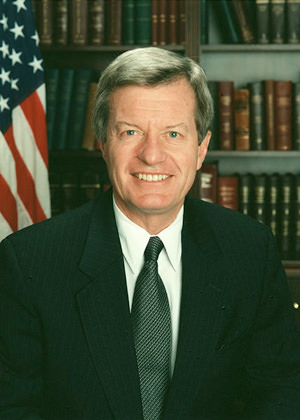Baucus’ Raucous Caucus
Single-payer advocates have been protesting in Senate Finance Committee hearings, chaired by Democratic Montana Sen. Max Baucus. Last week, at a committee hearing with 15 industry speakers, not one represented the single-payer perspective.
Barack Obama appeared this week with health-industry bigwigs, proclaiming light at the end of the health-care tunnel. Among those gathered were executives from HMO giants Kaiser Foundation Health Plan and Health Net Inc., and the health-insurance lobbying group America’s Health Insurance Plans; from the American Hospital Association and the American Medical Association; from medical-device companies; and from the pharmaceutical industry, including the president and CEO of Merck and former Rep. Billy Tauzin, now president and CEO of PhRMA, the massive industry lobbying group. They have pledged to voluntarily shave some $2 trillion off of U.S. health-care costs over 10 years. But these groups, which are heavily invested in the U.S. health-care status quo, have little incentive to actually make good on their promises.
This is beginning to look like a replay of the failed 1993 health-care reform efforts led by then-first lady Hillary Rodham Clinton. Back then, the business interests took a hard line and waged a PR campaign, headlined by a fictitious middle-class couple, Harry and Louise, who feared a government-run health-care bureaucracy.
Still absent from the debate are advocates for single-payer, often referred to as the “Canadian-style” health care. Single-payer health care is not “socialized medicine.” According to Physicians for a National Health Program, single-payer means “the government pays for care that is delivered in the private (mostly not-for-profit) sector.”
A February CBS News poll found that 59 percent in the U.S. say the government should provide national health insurance.
Single-payer advocates have been protesting in Senate Finance Committee hearings, chaired by Democratic Montana Sen. Max Baucus. Last week, at a committee hearing with 15 industry speakers, not one represented the single-payer perspective. A group of single-payer advocates, including doctors and lawyers, filled the hearing room and, one by one, interrupted the proceedings.
Protester Adam Schneider yelled: “We need to have single-payer at the table. I have friends who have died, who don’t have health care, whose health care did not withstand their personal health emergencies. … Single-payer now!”
Baucus gaveled for order, guffawing, “We need more police.” The single-payer movement has taken his words as a rallying cry. At a hearing Tuesday, five more were arrested. They call themselves the “Baucus 13.”
One of the Baucus 13, Kevin Zeese, recently summarized Baucus’ career campaign contributions:
“From the insurance industry: $1,170,313; health professionals: $1,016,276; pharmaceuticals/health-products industry: $734,605; hospitals/nursing homes: $541,891; health services/HMOs: $439,700.”
That’s almost $4 million from the very industries that have the most to gain or lose from health-care reform.
Another of the Baucus 13, Russell Mokhiber, co-founder of SinglePayerAction.org, has been charged with “disruption of Congress.”
He was quick to respond: “I charge Baucus with disrupting Congress. It once was a democratic institution; now it’s corrupt, because of people like him. He takes money from the industry and does their bidding. He won’t even diffuse the situation by seating a single-payer advocate at the table.”
As I traveled through Montana recently, from Missoula to Helena to Bozeman, health-care activists kept referring to Baucus as the “money man.” Montana state Sen. Christine Kaufmann sponsored an amendment to the Montana Constitution, granting everyone in Montana “the right to quality health care regardless of ability to pay,” or health care as a human right. It died in committee.
Wisconsin Sen. Russ Feingold, a single-payer advocate, said his position will not likely prevail in Washington: “I don’t think there’s any possibility that that will come out of this Congress.” That’s if things remain business as usual.
Mario Savio led the Free Speech Movement on the UC Berkeley campus. In 1964, he said: “There comes a time when the operation of the machine becomes so odious, makes you so sick at heart, that you can’t take part, you can’t even passively take part, and you’ve got to put your bodies upon the gears and upon the wheels, upon all the apparatus, and you’ve got to make it stop. And you’ve got to indicate to the people who run it, the people who own it, that unless you’re free, the machine will be prevented from working at all.”
“Unless you’re free,” the Baucus 13 might add, “to speak.” The current official debate has locked single-payer options out of the discussion, but also escalated the movement — from Healthcare-NOW! to Single Payer Action — to shut down the orderly functioning of the debate, until single-payer gets a seat at the table.
Denis Moynihan contributed research to this column.
Amy Goodman is the host of “Democracy Now!,” a daily international TV/radio news hour airing on more than 750 stations in North America. She is the co-author of “Standing Up to the Madness: Ordinary Heroes in Extraordinary Times,” recently released in paperback.
© 2009 Amy Goodman
Distributed by King Features Syndicate
Your support matters…Independent journalism is under threat and overshadowed by heavily funded mainstream media.
You can help level the playing field. Become a member.
Your tax-deductible contribution keeps us digging beneath the headlines to give you thought-provoking, investigative reporting and analysis that unearths what's really happening- without compromise.
Give today to support our courageous, independent journalists.






You need to be a supporter to comment.
There are currently no responses to this article.
Be the first to respond.